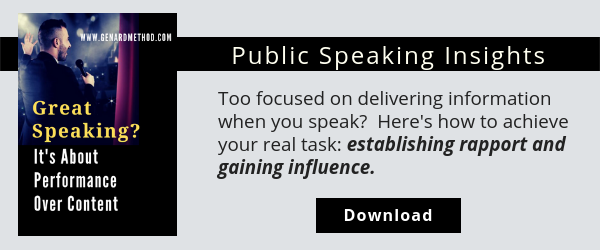
Are you too emotional in confrontations so you lose control? Here's how to handle yourself in an argument when you become too passionate.
Emotion is a powerful tool of public speaking. A lot is happening on an emotional plane in terms of audiences accepting what you say. That's why going into a speech or presentation prepared only to convey "important" information is a losing strategy.
How could it not be so? We can surmise that our species was able to convey feelings and intentions long before we could articulate our state of mind as language—probably by hundreds of thousands of years. What you say matters greatly. But what's underneath it, and what listeners draw upon, is a far deeper reservoir.
Speaking of language: do you know how to avoid saying the wrong thing? Learn more in my Free White Paper, "25 Words or Phrases to Avoid in Speeches and Presentations."
On the other hand, it is risky territory indeed when speech is controlled by one's emotions. Just as in acting, too much emotion on display ruins the performance. "Give me less," is a phrase that experienced directors often use with actors.
But shouldn't you let your passion show when you're planting your flag or defending that ground? Sure. Learning the right balance, though, and proceeding strategically, are both essential. Below are two ways you can do so.
Do you struggle when answering tough questions and challenges? Get my Free e-guide today, "How to Survive The '7 Danger Zones' of Q & A."

Strategy: Maintain Focus and Emotional Control
For many years, I've trained diplomats at the U.S. State Department, the United Nations, and foreign services. Much of that training was focused on this issue: maintaining emotional control and sticking to your game plan.
Those who question, and sometimes attack diplomats frequently have an agenda, and are using the opportunity of posing questions to further their goals. So retaining one's poise and equanimity are vital. But so is another aspect of defending your position in a conflict or argument: not losing sight of your purpose in this encounter (which, presumably, you're participating in voluntarily). This strategy applies equal well if your field of battle is business, law, healthcare, IT, finance, manufacturing, or in fact any other profession.
The key point here is this: don't let the argument, challenge, or even personal attack deter you from your goal. You have a purpose in this speech, presentation, pitch, press conference, etc. Just because you're being severely challenged doesn't let you off the hook. You must still stay focused on what you're trying to achieve through your answers. Becoming defensive makes that impossible. Keep aiming for your target! If you keep that in mind in the heat of the moment, you will be far more effective in influencing listeners the way you intended to all along.
Learn more about how to influence listeners the right way! Download my Free resource, "How to Be a Clear, Concise, and Compelling Speaker."

Tactics: Surprise 'Em by Going in the Other Direction
Speaking of the heat of the moment, here's a tactic that can blindside the opposition in an instant: go where they are not expecting you to go. If you and your opponent, say, have been climbing steadily higher up an emotional slope . . . try suddenly going down the hill. Your antagonist may find himself or herself all alone "up there," with nobody to swipe at any longer!
What I mean by that metaphor, is an argument or point of difference that's basically devolved into a shouting match. (If you watch cable shows with political interviews, you'll know exactly what I mean.)
Now is the time to maintain your focus! Learn how in my Free cheat sheet, "10 Ways to Stay Fully Focused When Speaking."
This principle is equally applicable to cross-examination in a courtroom or to TV media interviews. Often in those situations, your antagonist is trying to trap you into revealing something you'd rather not divulge. Their strategy in doing so may be either to a) turn up the emotional heat, or b) establish a rhythm of short questions and answers so you're lulled into complacency—until the zinger comes that you're not prepared for.
The rule of thumb is: the louder your opponent becomes, the softer you should be in reply. And the faster the tempo they try to establish, the more you should take your time in answering. You're going in the other direction, you see. It can sure put the opposition off of their game, and fast. But that's not really why you're doing it. You're actually protecting yourself as you maintain control of your emotional response. And remember my earlier point: it will be a lot easier for you to keep your eye on the prize, i.e., your purpose in participating in the encounter at all.
If you happen to come across as a more thoughtful and in-charge professional, well, you won't argue with that, will you?
You should follow me on Twitter here.
Gary Genard is an actor, author, and expert in public speaking training and overcoming speaking fear. His company, Boston-based The Genard Method offers live 1:1 Zoom executive coaching worldwide. In 2020 for the seventh consecutive year, Gary has been ranked by Global Gurus as One of The World's Top 30 Communication Professionals. He is the author of How to Give a Speech. His second book, Fearless Speaking, was recently named as "One of the 100 Best Confidence Books of All Time." Contact Gary here.



